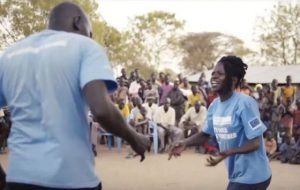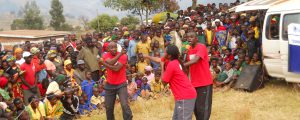Participatory theatre: Rwanda/ South Sudan/ Democratic Republic of Congo and others

Search for Common Ground is an international NGO that uses innovative tools to end violent conflict around the world. Working in over 30 countries with local partners and networks on conflict transformation they work at all levels of society to build sustainable peace through three avenues: dialogue, media and community. Taking a holistic approach they work with diverse groups including artists but also youth, media professionals, the military and police, politicians, religious leaders, prisoners and women tackling a range of issues that relate to peace-building including natural resource conflict, violent extremism, reconciliation, disarmament and reintegration, gender equality, democracy and elections, to name a few[1].
Search for Common Ground have made extensive use of the arts in their work, particularly of participatory theatre for conflict transformation[2], principally in Africa, in countries including Rwanda, South Sudan, Central African Republic, DRC and Burundi. Search for Common Ground’s work exemplifies an approach that applies and uses arts based approaches within a broader strategic programme, where the arts-based work is one strategy that is integrated within a portfolio of approaches and a wider programme that utilises other tools such as radio and media projects and inter-youth conferences and debates. See summaries of Search’s work in Niger[3] or Rwanda[4] for examples of this integrated approach.

Participatory theatre for social change involves actors going into a community and speaking with them, collecting their stories and listening to their problems, and then putting them into a form of drama where their stories, and the conflicts they entail, are presented back to the community. The actors encourage people to think and look at conflict with different options of response and non-violent response, to find solutions themselves. Audience members are invited to participate in the performance to act out possible solutions or scenarios, to adapt or challenge situations and performances are followed by discussions where the audiences members talk about the issues raised. Search for Common Ground works with local actors who are given specialist training and support to develop participatory theatre performances and workshops. Participatory theatre, in its different forms which include playback theatre and forum theatre, has an established history of use and application within community development settings, a developed literature, body of research and theoretical grounding[5]. Search for Common Ground have used this body of knowledge to develop their own specific form of participatory theatre for conflict transformation for use within their own peace-building programmes. Films made about their work in the Democratic Republic of Congo[6] and South Sudan[7] provide an insight into the different ways participatory theatre is applied in their work.
Search for Common Ground’s use of arts based methods is noteworthy for a few reasons. First because they use the arts as one strategy within a portfolio of approaches that support peace-building at multiple levels and in different spheres. Secondly they work long term in regions so arts projects are not only integrated into broader peace-building programmes but are delivered over longer time frames. Thirdly Search are one of the leaders of learning and evaluation in the peace-building field, spearheading the DME for Peace network[8]. They have extensively documented their programmes as well as conducting evaluation on their participatory theatre programs and producing resources for practitioners wanting to work with and evaluate participatory theatre[9].
Evaluation findings have included:
- In the DRC, participatory theatre involving military men and their wives proved to be a particularly effective way to train soldiers to not be sexual predators. A study of their work in DRC showed that 78% of audience members said that they had learned a great deal about how to deal non-violently with conflict.
- In Rwanda follow up studies with audience members showed they had not only gained knowledge and skills but that they could cite specific examples of how they applied this new knowledge to their own lives. They reported changes in behaviour among leaders toward citizens, reciprocal changes in citizens’ attitudes toward local leaders, and resolution of personal conflicts. In addition, the trained actors were empowered as social communicators and expanded their skills to successfully manage conflict[10].
References
[1] See Search For Common Ground’s website for a full account of their work: https://www.sfcg.org/what-we-do/
[2] See the dedicated section of their website: https://www.sfcg.org/tag/participatory-theater/
[3] See https://www.sfcg.org/niger-elections-2016/
[4] See https://www.sfcg.org/promoting-collaborative-land-conflict-transformation/
[5] See for example
[6] Search for Common Ground’s work in Democratic Republic of Congo: https://www.youtube.com/watch?v=CaXR3PKXvoM and here https://www.youtube.com/watch?v=ph7_nJP5MQs
[7] Search for Common Ground’s work in South Sudan: https://www.sfcg.org/performing-miracles/
[8] See http://www.dmeforpeace.org/
[9] Herrington, R., 2016. Monitoring and Evaluation of Participatory Theatre for Change. Search for Common Ground. Available at: https://www.sfcg.org/wp-content/uploads/2016/08/PTCMEModule_071816.pdf
Slachmuijlder, L., 2012. Participatory Theatre for Conflict Transformation. Training Manual. Search for Common Ground. Avaliable at: http://dmeforpeace.org/sites/default/files/Participatory-Theatre-Manual-EN.pdf
[10] Smith, S & Webb, E, 2011. Acting Out of Conflict: Using Participatory Theatre as a Tool of Peacebuilding in Rwanda. Search for Common Ground. Available at: http://www.comminit.com/edutain-africa/content/acting-out-conflict-using-participatory-theater-tool-peacebuilding-rwanda
